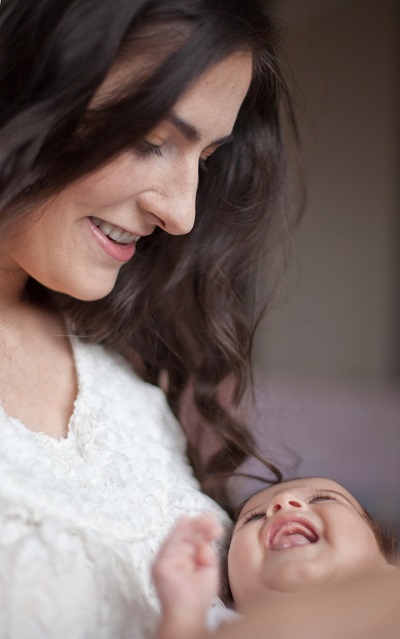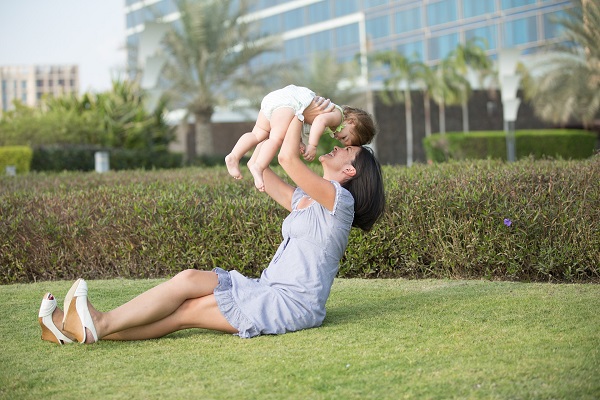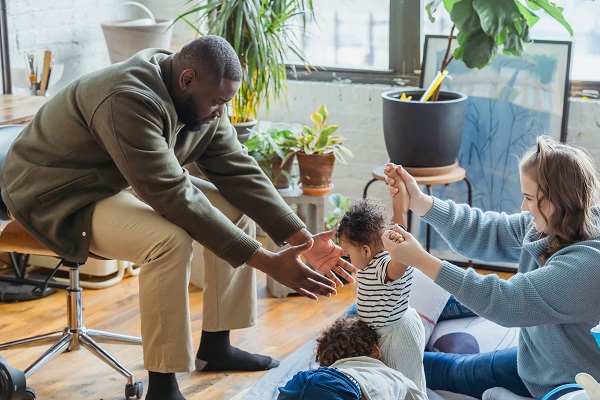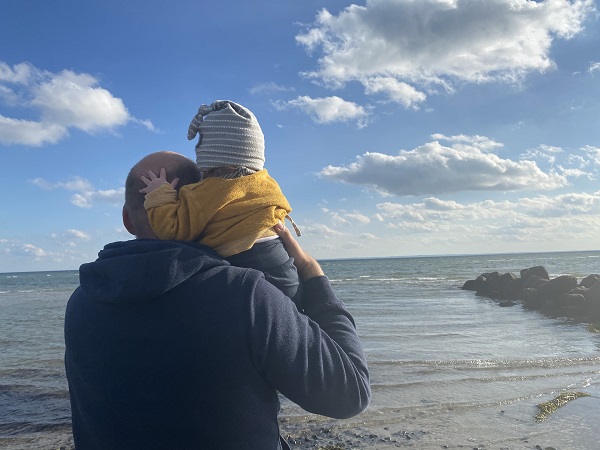Positive Health Online
Your Country

Why our Body is Often Under More Stress after the Birth than during Pregnancy
by Christophe Champs(more info)
listed in bodywork, originally published in issue 288 - August 2023
It goes without saying that we pay attention to the health of a mother while she is pregnant, but it is also important to consider the time after childbirth. Postpartum, the body is still under a lot of stress and will be moving in a way it is probably not used to. And it’s not just mothers who are affected, fathers need to consider the impact on their bodies too.
The two years after childbirth can be more difficult for a woman’s body than the nine months of the pregnancy. And for men, these two years see an increased risk of developing back and neck pain, generally due to a lack of awareness about the health impacts of their new role as a father.
So, what can new parents do to prevent unnecessary aches and pains?

Let People Know
Pregnancy ends suddenly (relatively – those who have endured hours of labour may disagree), but a mother’s body doesn’t immediately snap back into a pre-pregnancy state of being. It takes time for the body to return to where it was before getting pregnant.
One challenge for new mothers and their postpartum journey is that it isn’t quite as obvious that their bodies are not 100% back in shape. People don’t tend to feel the same compulsion to look after a new mum – without a new born to provide context clues, things like offers of a seat on a bus become rarer. Without a bump or a baby, people have no way to know that physically a new mother might not be entirely capable of what they were before pregnancy.
Because we are all different, we send different signals and understand messages differently; we misunderstand many people and are misunderstood ourselves. This can lead to a range of ‘bad feelings’ when, in reality, we should probably just work harder on making ourselves understood. It is important that new mothers gently remind family, friends and colleagues that they are not 100% back yet and still need a little extra consideration. The body needs time to recover and shouldn’t immediately be asked to do everything it was comfortably doing before the pregnancy.

Carrying a New Baby
A new baby means extra things to carry. There’s the baby, but also a great many extras, including carry cots, prams and spare nappies. Whenever we are lifting something, we should bend our knees, keep our back straight, and then use our legs to power us (and whatever we are lifting) up. That’s in a perfect world. But in the world of the new parent, technique will slide from time to time, but it is important to lift things correctly and safely as much as possible to help protect and strengthen the back.
If anyone feels any pain or their body tells them that they have pulled something or that all is not quite right, help should be sought. And new parents need to careful not to dismiss these warning signs; ignoring them will only make things worse. In the short-term, pain may go, but this is usually due to other muscles compensating, and then the injury or imbalance becomes embedded, creating a lot more damage, and that is much harder to correct.
Me Time with Added Benefits
Having ‘me time’ is something well-being and parenting experts talk about all the time. And it is important. But it isn’t always easy to find that time, especially if no one else is involved. But we are usually good at keeping appointments with others; if we make an appointment to see someone most of us will find a way to stick to it.
So, here is a suggestion that makes ‘me time’ easier to pull off: book in with a health practitioner like an osteopath, chiropractor, massage therapist or biomechanics expert. By booking in with one of these experts, a new mother will get an hour that is entirely focused on them, they also get treatment that will help muscles relax, reset posture and alignment, and ensure that any aches or pains don’t get worse or turn into something debilitating that will prevent giving baby the care they need.
Additionally, babysitters are more likely to come forward when health-related appointments are involved.

Bad Sleep, Bad Posture, Bad Back
Sleeping issues, deteriorated posture, and back pain must all be tackled, but as they are all connected, it can be difficult to know which issue is causing the other. I recommend starting with whatever is presented first or is most limiting; by addressing one, all will be impacted.
How to Deal with Sleeping and Resting Issues?
Having a good night’s sleep (usually eight hours a day) helps the body to heal and reset before the start of a brand-new day. But during the postpartum period, getting eight hours in one go may be close to impossible, so new mothers should focus on building up eight hours across the 24-hour period. If that is eight one-hour sleeps, so be it.
In addition to the quantity of sleep, the quality of sleep can be boosted by making sure that pillows and mattress are at their best, and that we lie comfortably and not twisted or bent in a chair – something even the childless should consider.
A bad sleep (too superficial or too little) and poor rest will affect both standing and sitting postures and stress and fatigue have the ability to manifest as a pain in the back and neck throughout the day. Sleep is not just about banishing tiredness. It will also help the body feel better and give the strength needed to get through all the tasks of the day.
Is There Such a Thing as Good Standing and Sitting Postures When Carrying a Baby?
The sitting and standing posture of new parents will not be perfect when carrying their baby, but for a good reason.
Whether standing or sitting with a baby, there are two postures to consider: the parent’s and the baby’s. Backs must be straight, neither twisted nor slouched, and the knees forwards. It gets easier as the baby builds up some muscle and develops motor skills.
Adopting bad sitting and standing positions may result in some niggles here and there, but pain is a friend. It is sending a message. So, check posture and sitting positions and attempt to straighten and balance them.
Although one of our missions at PODO is to educate patients on the importance of having good standing, sitting, and sleeping postures, we recommend that during the postpartum period, this can be relaxed a little (not completely) with a focus on stretching, strengthening and conditioning the body to cope with all those bad positions that parents might take and hold for long periods.
Using the Body to Help the Mind
Physical and mental health are connected. Stretching and exercise will not only help the body, but it will also help the mind too. New parents should include some dedicated exercise/stretching time in their day.
Footwear
A woman’s body has changed shape during pregnancy with its weight distribution having shifted. Now postpartum, the weight and shape is changing again. Plus, there are all the other pressures on the body, so good support is needed, and support for the body starts at the feet. As much as possible, new mothers should wear shoes that give good support on the arch and ankle. Slippers, flipflops, and strappy heels won’t do any favours. Sure, wearing them for a few short hours on a rare evening out, or while at the pool, is fine, but for the rest of the time choose shoes that will help the body.
Opting for ‘walking’ style shoes that provide ankle support, ensure they can be laced up (this gives the foot much more support inside the shoe), and if possible, it is advisable to speak to a biomechanics expert to see if there would benefit from custom-made orthotics. By ensuring the body is balanced and aligned from the foot up, parents will be much stronger and better able to cope with all the physical demands a new baby puts on them. This applies to men as much as women. A man’s body may not have changed shape in the same way, but there will be new demands on the muscles, back, neck etc., and therefore the importance of balance and alignment is the same.

Conclusion
We know that a woman who carried a baby has been affected by physical and hormonal changes that require time to settle. In addition, for both parents, the arrival of a baby comes with a loss of sleep and a lack of focus on their own bodies.
During the postpartum period (around two months) and beyond (up to two years), lots of back and neck pain can be prevented. The environment and circumstances are more challenging than ever but, with some help and guidance, new parents can enjoy the journey and take the worry of how their health will suffer off their list of considerations.
Comments:
-
No Article Comments available